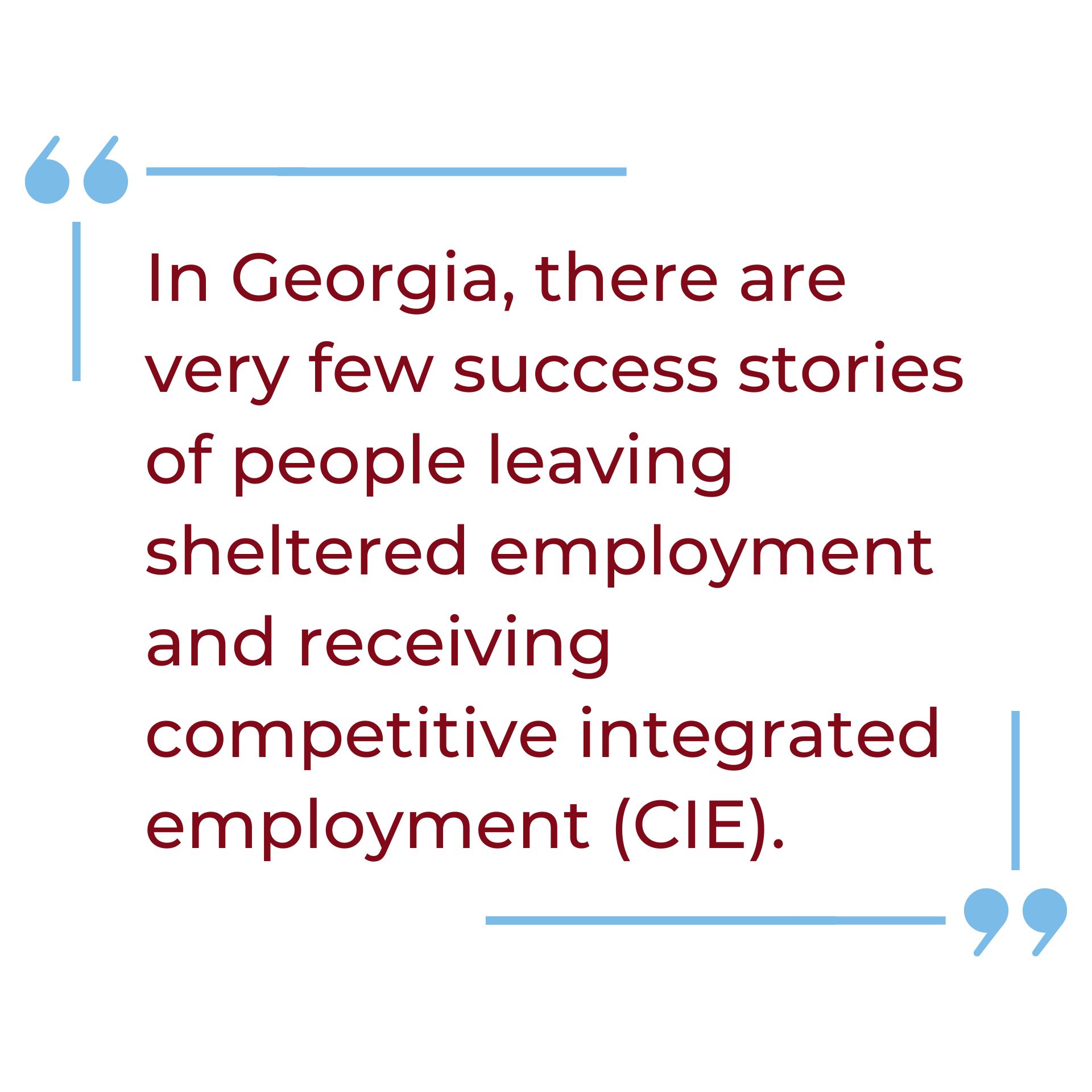Expert Update: What Happens When a Person Leaves a Sheltered Workshop?
Navigating the complex world of employment is a challenge that millions around the world face at one time or another.
For Georgians with disabilities, the task can be all the more difficult, particularly due to the presence of sheltered workshops, which are meant to serve as a means of vocational training for Georgian’s with disabilities.
Such facilities, which are certified by the Department of Labor (DOL) under the Fair Labor Standards Act (FLSA) 14(c) program, are allowed to pay workers with disabilities wages far below the federal minimum, also known as subminimum wages. What is more distressing is that, according to the Government Accountability Office (GAO), only 5% of sheltered workshop employees ever leave their positions to work in the community.
 Amy Price, Consultant for Advancing EmploymentAmy Price is a consultant with Advancing Employment, an organization, funded by the Georgia Council on Developmental Disabilities (GCDD) that provides statewide technical assistance to organizations that employ people with disabilities. Her work is dedicated to serving individuals with disabilities.
Amy Price, Consultant for Advancing EmploymentAmy Price is a consultant with Advancing Employment, an organization, funded by the Georgia Council on Developmental Disabilities (GCDD) that provides statewide technical assistance to organizations that employ people with disabilities. Her work is dedicated to serving individuals with disabilities.
According to Price, many individuals who begin work in sheltered workshops often never leave.
“People rarely leave sheltered workshops; they stay stuck,” Price said. “The way things change is when organizations realize that sheltered workshops shouldn’t exist and work to do something different. In Georgia, there are very few success stories of people leaving sheltered employment and receiving competitive integrated employment (CIE).”
One of the reasons for this struggle, Price said, is a lack of emphasis on employment on the state’s part. Oftentimes, individuals who leave sheltered workshops do not attain CIE and, instead, participate in day programs, which do not typically provide meaningful activities. People may also find it hard to adjust to or seek CIE after growing accustomed to being in a sheltered workshop for many years.
Furthermore, many individuals with disabilities feel overwhelmed by the abundance of barriers present in our current systems, such as employers having preconceived notions that people with disabilities will be liabilities to their workforce.
“Barriers can look so different from person to person,” Price explained. “It may be that [people with disabilities] don’t believe they can work because they have been told they are not good enough or that they are only destined to be in a sheltered workshop or day program. Sometimes barriers can come from state agencies, employers, mobility and communications concerns, and even family members.”
Much of Price’s work with Advancing Employment focuses on breaking these systemic barriers, including providing technical assistance for workers on site, hosting webinars and Georgia’s National Disability Employment Awareness Month (NDEAM), and working with the state legislature to pursue FLSA 14(c) reform. Price and Advancing Employment strive to help Georgians with disabilities tap into their inner strengths, allowing them to channel their talents into a vocation with meaning.
“I tell people when I do training, ‘You have one of the hardest jobs. You have to really listen deeply and find the gifts and strengths of somebody who has been devalued by our society,’” Price said. “‘You have to work with family members and work with employers, and that involves a whole different way of supporting them and helping them think differently about hiring people with disabilities.’”
According to Price, the ability to leave sheltered workshops and pursue CIE is based on the initiative of the individuals, their families, and if applicable, their providers.
“The first step is to have that conversation with your family or providers: does the person and their family see a different vision for themselves and want to seek it out for themselves? Does the provider understand that everybody can work and help to support that person?” Price said. “The Georgia Vocational Rehabilitation Agency (GVRA) and Department of Behavioral Health and Developmental Disabilities (DBHDD) are the resources we have in place in Georgia to make the process easier, but again, there are so many limitations in front of people actually being able to work.”
Although it may seem daunting, it is possible to leave sheltered workshops. There have been success stories in the past, such as a man who worked at a sheltered workshop for several years before leaving to work at Home Depot, where he has remained employed for ten years. Another case is a woman who was able to transition from a sheltered workshop to working at the YMCA.
“At first, the woman’s parents needed a lot of support and assistance to understand that she was capable of carrying out the job,” said Price. “Now they are fabulous examples of advocating for their working daughter.”
Price and Advancing Employment tirelessly continue their work to improve the lives of Georgians with disabilities, and though the various systems currently in place make such work a challenge, they are constantly striving for progress and growth. For more information, visit https://www.advancingemployment.com/.